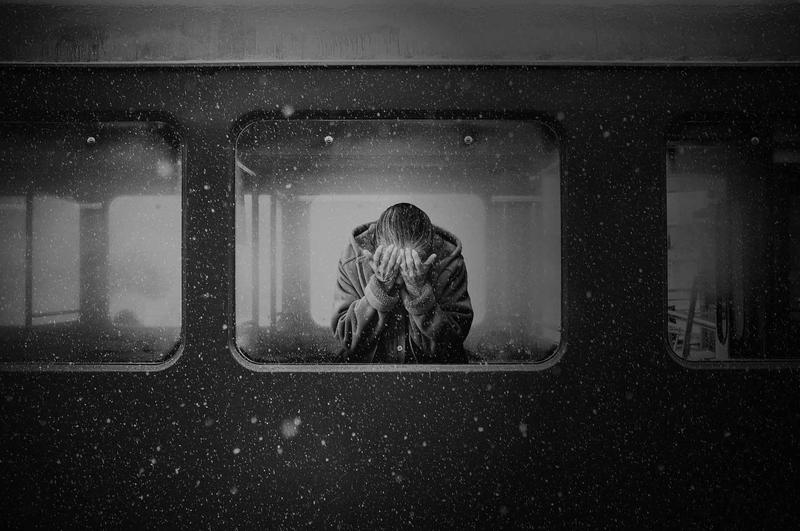by Tara E. Friedman
May 11, 2021
Tara E. Friedman currently resides in Eastern Pennsylvania with her husband and family. When not writing or teaching, she is happily immersed in a variety of outdoor activities. She proudly serves as English faculty at Widener University in Chester, Pennsylvania. While she presented and published on critical thinking and writing center theory and pedagogy, her current research focuses on resilience in children and young adults, literature and the environment, and American humor.
Worsted by Garielle Lutz; Short Flight/Long Drive Books; 215 pages; $16.95
Garielle Lutz’s collection Worsted is a study of detail: people, places, and movements within the spaces of messiness in everyday life. The 14 fractured narratives are razor sharp, each sentence, parenthesis, and mark of punctuation placed to tell their own story of a writer drawn to the granular level of things. Readers of Worsted will reinvest time in the quiet certitude that language (and how we use it) is still deemed essential.
There exists an intimacy to Lutz’s episodic style, a superimposition of lived characteristics one garners after eavesdropping on private conversations or people watching at a crowded mall. Her melancholic musings are intuitive and at times humorous, like those one might hear from a carping mother or old friend. Similar to the shifts of a camera lens coming into focus, Lutz galvanizes the peripheral, the subjects, objects, and decisions present but almost unnoticeable within our daily lives.
Garielle Lutz authors this collection, an ineluctable change from previous works written under the nom de guerre Gary Lutz; her writing is most notable in its ability to fastidiously describe that which does not fit—names, places, and relationships (with ourselves and other people) we try on and shed off along the way. In the opening story “Worsted,” one of the narrator’s wives laments the unbefitting titles of marriage: “‘wife looks and sounds just a little too sure of what it’s meant to be meaning. It’s got too much of a hold on its meaning for its own good. Husband doesn’t even sound as if it’s fit to refer to a person. It sounds like something extra you have to put on just because you’ve been told to, even though you feel you’re already fully dressed’” (6). The uncomfortableness of imposed identity acts like an itchy, second skin, waiting to be sloughed off. Lutz anatomizes this thread throughout many stories in the collection, offering astute commentary on the communities of which we are (unwillingly at times) a part. Some of her more trenchant critiques come in the parentheses (one is advised to pay particular attention to these details), like the narrator’s refusal to call the dog by its name in “Unnatively” because “(it didn’t fit)” (121).
Lutz masterfully examines the mundanity of life with precision and humor. While the narrator in “Cheap Nights” laments that they “had never liked feeling a point of view being trained on me too sharply” (163), Lutz’s attention to exacting language is unrelenting. Readers of the collection are not offered the same release as the narrator in “Pressed Powder,” who recalls, “It’s all well and good for me to overlook how hidden I was even from myself in those days” (88). There are no places to hide, no detail missed within the stories. Lutz extracts meaning from monotony, whether it be a shifting of weight between legs or the sound a chair makes in a mechanic’s shop. The small breaths readers can take come from Lutz’s humor within reclusive moments or cumbrous interactions. In “A Low-Hanging Towel” absurdity thrives, as the man reduces his bath preparations with “store-bought . . . salts and foams, tablets, fizzing sweeteners, syrups . . . to cake mixes, leftovers . . . [so] the water got thick and chowdery” (68-69). These are the microscopic pursuits that fill our days —baths, trips to the laundromat, shoddy apartment-style living—that highlight a deep loneliness found within the work.
Lutz’s form comes in cut and paste fashion, as parts of pieces were written years (even decades) apart. Others have noted an intentional chafing—Lutz calls it friction—between snapshots. For example, “Rules for Tenants” moves the reader from farcical legal jargon on a renter’s lease—“2. Any tendency among tenants to throw their presence upon others living in the complex is to be curbed at all times” (126)—to indictments of past wrongdoings set in the backdrop of a dismal apartment building located in an unremarkable cityscape. The same happens in “Chalazion”—each section separated by 3 black dots—almost like an ellipsis—taunting circles suggesting more to come on any one topic, but it never does. No one person or place stays around for too long. These stories in particular lend themselves to a kind of frenetic pace of inactivity best avoided by enervate eyes.
In “Written at Work,” Lutz writes, “I never got good at spreading things thin. I needed everything thick and threatening” (195). The confession might as well be the epigraph to the collection. Worsted is not for everyone. It stands out as a love story dedicated to difference—a devotional to the complexities of loneliness and language intertwined into a beautiful tapestry distinguishable by few but already beloved by many.
©2021 West Trade Review
__________________________________________________________________________________________________________________________________________________________________________
__________________________________________________________________________________________________________________________________________________________________________
__________________________________________________________________________________________________________________________________________________________________________
__________________________________________________________________________________________________________________________________________________________________________
__________________________________________________________________________________________________________________________________________________________________________
The Messiness of Everyday Life: Melancholic Musings of Garielle Lutz's Worsted
FICTION REVIEW
Image by cocoparisienne on Pixabay
Stay Connected to Our Literary Community. Subscribe to Our Newsletter




